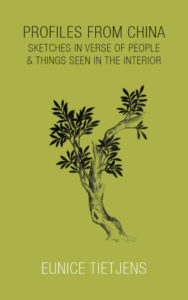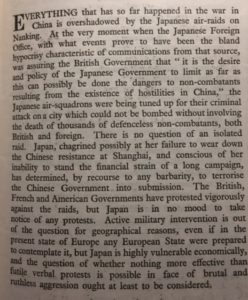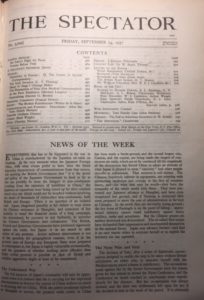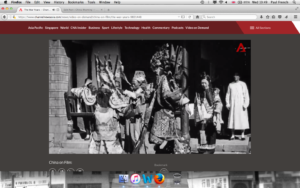Posted: January 19th, 2018 | No Comments »
I’ve blogged about the Swiss author, photographer and adventurer Ella Maillart before (here with her partner Annamarie Schwarzenbach, and here the fine Albatross edition of her Peking to Kashgar book Forbidden Journey). She made the overland trip with Peter Fleming (the whole story is in my book Through the Looking Glass) and he published his own book of the adventure, News from Tartary. Here, shortly after publication in England, is an advert for the book from The Spectator in 1937. Calling her ‘Peter Fleming’s companion’ obviously raised awareness of Maillart in England and they were very much equals on the trip and remained friends afterwards….

Posted: January 17th, 2018 | No Comments »
I just read Robert Harris’s novel Munich. Obviously I was aware of the Munich Agreement, ‘peace in our time’, Hitler, Chamberlain, Daladier, Musso and all that. What I hadn’t known was two Asia Hands were on the British and French negotiating teams, respectively – the Japan Hand Frank Ashton-Gwatkin for the British and Alexis Leger for the French.

Leger was a french diplomat who wrote poetry under the pen name Saint-John Perse – his most famous work Anabasis. Leger was the press attache at the French Legation in Peking between 1916 and 1921. Anabasis is suffused with imagery from China and Asia. No less than TS Eliot translated it into English in 1930. Leger was anti-Nazi and suffered under Vichy. Harris has him pop up a few times in the novel though has him down as being born in Martinique when in fact he was born in Guadelope.

Munich, 1938 – Leger, with black suit, hair and mustache, stands just to the rear and the right of Mussolini
Frank Ashton-Gwatkin was also a diplomat who wrote under a pen name, John Paris. Ashton Gwatkin served at a number of British embassies in Asia and became fluent in Japanese. He returned to England and joined the Far Eastern Department of the Foreign Office in 1919. Ashton-Gwatkin’s literary work concentrated on his experiences of Japan and included the novels Kimono (1921), Sayonara (1924), Banzai! (1925), The Island beyond Japan (1929), Matsu (1932) and a collection of verses A Japanese Don Juan and other Poems (1926). I’m afraid I’ve never read any of them so can’t comment on whether they are any good or not. Harris describes Kimono as lurid and says the Japanese were so outraged he was thrown out of the country and recalled to London in disgrace (which I don’t think is true as it was published two years after he’d returned anyway?).

Posted: January 16th, 2018 | 5 Comments »
I happened to notice that (in the UK) Channel “5 Spike” (on satellite and freeview and all that…) is showing the movie 49th Parallel this coming Saturday at 2.20pm.
In the early days of World War II, a German U-boat is sunk in Canada’s Hudson Bay. Hoping to evade capture, a small band of German soldiers led by commanding officer Lieutenant Hirth (Eric Portman) attempts to cross the border into the United States, which has not yet entered the war and is officially neutral. Along the way, the German soldiers encounter brave men such as French-Canadian fur trapper Johnnie (Laurence Olivier) and soldier Andy Brock (Raymond Massey).

Now why should this blatant piece of British propaganda aimed at getting isolationist America into the war against the Nazis interest China Rhyming readers I hear you ask? Well, the answer is Ley On…
Ley On is a largely forgotten part of British-Chinese history, and he deserves to be better remembered…I first came across Ley On in a 1932 article in The Queenslander (Australian) newspaper about Chinese restaurants in London…

Ley On’s restaurant in 1947
RETRACING our steps and crossing Shaftesbury Avenue at Wardour Street is the first restaurant in London to be called Chop Suey. This was opened by Ley On, a film artist, who has played in pictures with Anna May Wong. The premises consist of two floors at the corner of Meard Street, with entrances in both thoroughfares. Here may be purchased every kind of Chinese food and even delicacies like shark’s fin, while bowls and other crockery, ivory chop-sticks, Chinese pencils, and Chinese gramophone records are on sale, and are exhibited in cases round the walls. The lower room has some very amusing paintings, for when Ley On opened his restaurant he invited his artist friends to roll up and help in the decorating. Strange tales told out of Burmah, Indo-China, Siam, and every corner of the Eastern world may be gathered and conjured from these walls.
And indeed Ley On was an actor, originally from China, who arrived in Europe some time after the First World War. He appeared in at least eight films starting with a German film – Der Weg Zur Schande – in 1930. That was one of Anna May Wong’s German films where she went to work with the expressionists after having been a success in London in Piccadilly. The film did come out in the UK as The Flame of Love, so audiences would have seen him in London.
Ley On was apparently born in Canton in 1890 but, after visiting Germany, settled largely in London – in 1931 he appeared in the film The Boat from Shanghai (a forgettable romance on the high seas pic), a movie also known as Chin China Chinaman.He then appeared in a British vehicle for Charles Laughton called The Beachcomber (1938) from the Somerset Maugham novel. During the Second World War War (once he had opened his restaurant in the early 1930s and it was still running successfully) he was obviously in London and did his bit appearing in the Powell & Pressburger patriotic movie 49th Parallel, a movie aimed at getting the reluctant yanks to come and fight fascism – Ley On played an Eskimo!!I’m not sure but I think the only photograph of Ley On I can find is the one below – a still from 49th Parallel with an eskimo in the background, possibly Ley On (but I can’t be sure – he’s not credited in the photo).
 In 1942’s forgettable Banana Ridge he played a Chinese “boy†though he’d have been 52 by that point! He carried on appearing in Brit-flicks after the war – in 1947 heading to North Wales (aka the Himalayas!) with Deborah Kerr and Flora Robson for Black Narcissus, another Powell and Pressburger flick and a big hit – certainly his biggest. His last credited film appears to have been in 1950 – The Black Rose – absolute nonsense about Norman archers going to China with an embarrassed looking Orson Welles, Tyrone Power and Jack Hawkins.
In 1942’s forgettable Banana Ridge he played a Chinese “boy†though he’d have been 52 by that point! He carried on appearing in Brit-flicks after the war – in 1947 heading to North Wales (aka the Himalayas!) with Deborah Kerr and Flora Robson for Black Narcissus, another Powell and Pressburger flick and a big hit – certainly his biggest. His last credited film appears to have been in 1950 – The Black Rose – absolute nonsense about Norman archers going to China with an embarrassed looking Orson Welles, Tyrone Power and Jack Hawkins.

Somehow between the movies and the catering business, Ley On did well. Ley On’s was known as a fairly romantic spot due to its subdued lighting and (unusually for 1930s Chinese restaurants) fully licensed bar that allowed couples to drink before dinner. And couples also might be able to star spot as it was a rather busy celebrity hangout given Ley On’s contacts. The young Richard Attenborough popped in regularly; the actress Kay Kendall would reputedly walk in, demand the best table and announce she only had one pound to spend. Ley On, who knew the added value of fashionable celebrities at the best tables for everyone to see, ensured she got the best seats and a good dinner for her single quid. Ley On, it seems, could afford such things and became quite wealthy from the restaurant business – he was known for riding around Soho in his white Bentley driven by a Burmese chauffeur and moving among the tables speaking to guests who noted his large diamond ring. Still, the more Bohemian side of life continued – Scotland Yard reportedly routinely watched the restaurant and its clientele in the late 1930s after reports that the London branch of the Anglo-Soviet Youth Friendship Society, a Communist Party ‘Front’ organisation, had been established over a dim-sum lunch at Ley On’s. The restaurant was still open for business in the mid-1990s billed as ‘London’s Most Famous Chinese Restaurant’, though had moved premises to No.56 Wardour Street in the 1960s.
Ley On’s original premises are still there – now a rather tacky slot machines arcade called Las Vegas. If anyone knows anything else about Ley On I’d love to hear from you….

Posted: January 15th, 2018 | 2 Comments »
How lovely to see that the American Chamber of Commerce in Shanghai has included Carl Crow in its timeline – apparently on the wall of their offices in Shanghai’s Portman Centre (not the city’s most wonderful piece of architecture, but never mind)…The mention notes Carl’s involvement in the negotiations in 1923 to secure the release of various foreign and Chinese hostages up in Shandong – a mission he undertook under the joint auspices of the AmCham and the Red Cross in Shanghai….of course if you want to know more my biography of Carl is still available (amazon.co.uk or amazon.com).
 (photo courtesy of the extremely talented snapper John van Fleet)
(photo courtesy of the extremely talented snapper John van Fleet)
Posted: January 14th, 2018 | No Comments »
I’m very pleased to say that my little new year posting of some (now) rather obscure Eunice Tietjens poems from China, all written c.1915, has inspired Camphor Press to reissue Tietjens collected verse on China – Profiles from China: Sketches in Verse of People & Things Seen in the Interior. It’s a very nice and very cheap e-book. Tietjens’s verse is problematic in many ways in 2018 – lots of ‘othering’ and so on – but she was a genuine visitor to China – including Shanghai’s International Settlement and Hong Kong – so her work has the value of being part of the collective memory of foreigners in China in the first half of the twentieth century.

Posted: January 13th, 2018 | No Comments »
Sail from Southampton (in 1937) down to the Dutch East Indies…delightful…

Posted: January 12th, 2018 | No Comments »
Here’s The Spectator’s editorial from 1937 on Nanking. Though we now think of The Speccie as the house journal of the more vulgar elements of the Tory Party, in the 1930s it was, for a period, one of the most outspoken English publications on the rise of fascism and German nazi-ism, as well as Japanese militarism and the threat to China, though the publication generally supported Chamberlain’s appeasement policy. It’s an interesing read anyway i think…


Posted: January 11th, 2018 | 1 Comment »
I spent much of the summer as the Historical Consultant on a two-part documentary, China on Film. The documentary was produced by Make Production for Channel News Asia in Singapore, directed by Jeremy Bristow and narrated by the cinematographer Christopher Doyle. The documentary covers film of China from the very earliest early twentieth century footage to the Second World War – most of it is from the treasure troves of the British Film Institute Archives in London. You can imagine that a summer in a dark room watching footage of old China and trying to work out where, what, who and when was about the best summer imaginable for me!!
Anyway, you can watch the two episodes here on Channel News Asia’s website….

Mystery still surrounds the earliest film ever made in China – recently discovered in a shop basement in the north of England. Young men in mandarin attire laugh and joke as they glance at the camera, eyeballing the 21st century viewer from the time of the Qing Dynasty. Since those gentlemen were recorded on celluloid, China has experienced nearly 120 years of momentous change.
These first fleeting images are part of a unique collection of early films at the British Film Institute (BFI), covering every facet of Chinese life from the time of the Boxer Rebellion to the Communist victory in 1949. Â
With unique access to the BFI National Archive, this 2-part documentary shows films never seen before this outside the UK. The best of these extraordinary images are worked into a compelling narrative to reveal new insights into this period of tremendous change and turmoil in China. Voiced by renowned cinematographer Christopher Doyle, the films capture a pre-CCP China in vivid motion. Â
Read more at https://www.channelnewsasia.com/news/video-on-demand/china-on-film














